#madame armfeldt
Explore tagged Tumblr posts
Text
A little night music fancast.
Desiree Armfeldt. Jennifer Morrison.
Fredrik Egerman. Chris Pine
Madame Armfeldt. Glenn Close
Fredrika Armfeldt. Brooklynn Prince
Petra. Emma Myers
Henrik Egerman. Aidan Gallagher.
Anne Egerman. Anna Cathcart
Countess Charlotte Malcolm. Amanda Seyfried.
Count Carl-Magnus Malcolm. Eddie Redmayne.
Frid. Graham Phillips.
#sondheim#a little night music#desiree armfeldt#jennifer morrison#fredrik egerman#chris pine#madame armfeldt#glenn close#fredrika armfeldt#brooklynn prince#emma myers#henrik egerman#aidan gallagher#anne egerman#anna cathcart#countess charlotte malcolm#amanda seyfried#count carl magnus malcolm#eddie redmayne#graham phillips
1 note
·
View note
Text
Cabaret's Shifting Lead Placement
Welcome to another rambling theatre history lesson with DroughtofApathy. Today we're going to examining the fascinating history of Cabaret's ever-changing lead roles.
Ground rule: Tony eligibility for Lead Actor/Actress is first determined by "above-the-title" billing in the show's opening night Playbill. It was a far stricter guideline in the past, as you'll see. These days, many lead roles aren't put above the title (ex. Hadestown, Kimberly Akimbo, etc.) but will be placed in lead categories either because it's obviously a lead, or because producers lobby for it. Conversely, actors can have "above-the-title" billing and be in featured roles, usually because they're major names like Angela Lansbury and Elaine Stritch, who were both Madame Armfeldt in the 2009/2011 revival of A Little Night Music. In which case, producers will usually submit them as featured.
When Cabaret opened on Broadway in 1966, Jill Haworth (Sally), Jack Gilford (Herr Schultz), and Bert Convey (Cliff) got top billing with Lotte Lenya (Fraulein Schneider) in the coveted "and" slot just below. Note who's missing. That's right. When the show premiered, Joel Grey (Emcee) was just a regular old featured role.
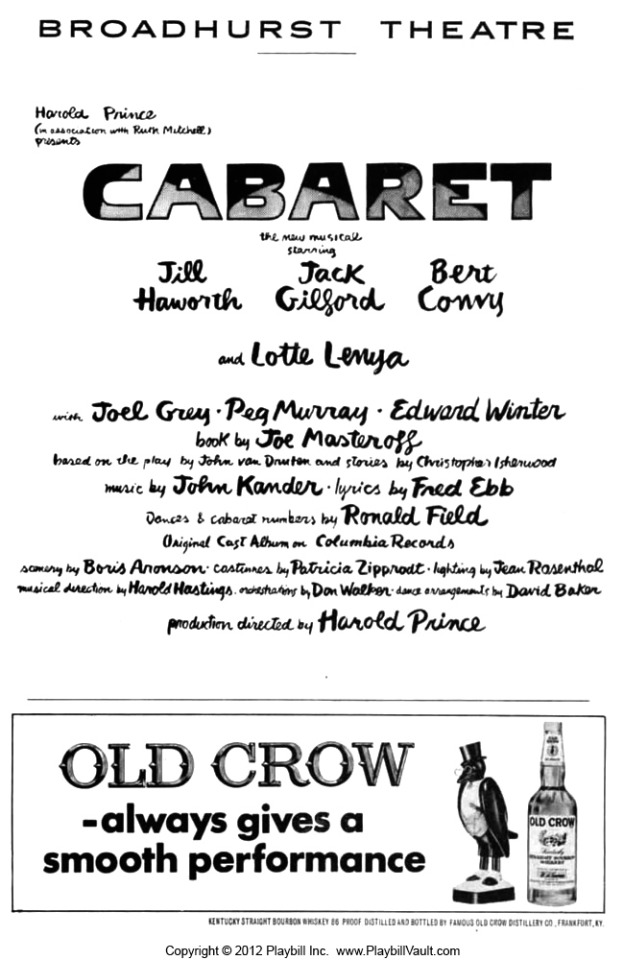

Left: opening night playbill billing. Right: post-Tony rebilling with Joel Grey's ascension.
At the 1967 Tonys, Jack Gilford (Herr Schultz) and Lotte Lenya (Fraulein Schneider) were nominated as Leading Actor/Actress, respectively, while Joel Grey and Edward Winter (Ernst Ludwig) were both in Featured. Jill Haworth (Sally) was not nominated, but would have been eligible for Lead as she had "above-the-title" billing. At the time, Joel Grey was just another working actor. Not so after Cabaret. His performance elevated both the role and his billing, thus transforming the Emcee into a Leading Role from then on.
Subsequent productions would focus more on Sally and the Emcee, while Schultz and Schneider (and the non-singing Cliff) would become featured roles. However, the "above the title" Tony ruling was far stricter back in the day, leading Sally (this time Alyson Reed) to once more be featured in the 1987 revival.


Left: opening night Playbill billing. Right: poster billing
In 1987, Joel Grey was given the sole "above-the-title" billing with Alyson Reed in the next featured spot. Though Sally was, like 1966, technically a lead role, she was nominated in featured at the Tonys that season. (Grey was not eligible as he was reprising his role.) In this production, Regina Resnik (Schneider) and Werner Klemperer (Schultz) both got fancy featured billing and nominations in their respective categories. As Cliff, Gregg Edelman got the "and" billing, but in this case it was less elevated than either Resnik or Klemperer (note the boxes). Edelman was still early-career at this point, and not yet a "name" but Cliff was still considered an elevated role in the company.
By 1998, however, the roles as we currently think of them had finally slotted into place. Alan Cumming (Emcee) won for Best Actor, Natasha Richardson (Sally) for Best Actress and Ron Rifkin (Schultz) for Featured Actor. Mary Louise Wilson (Schneider) was nominated in Featured Actress. Richardson also received left-side billing, as she was a larger name (arguably) than Cumming at the time.
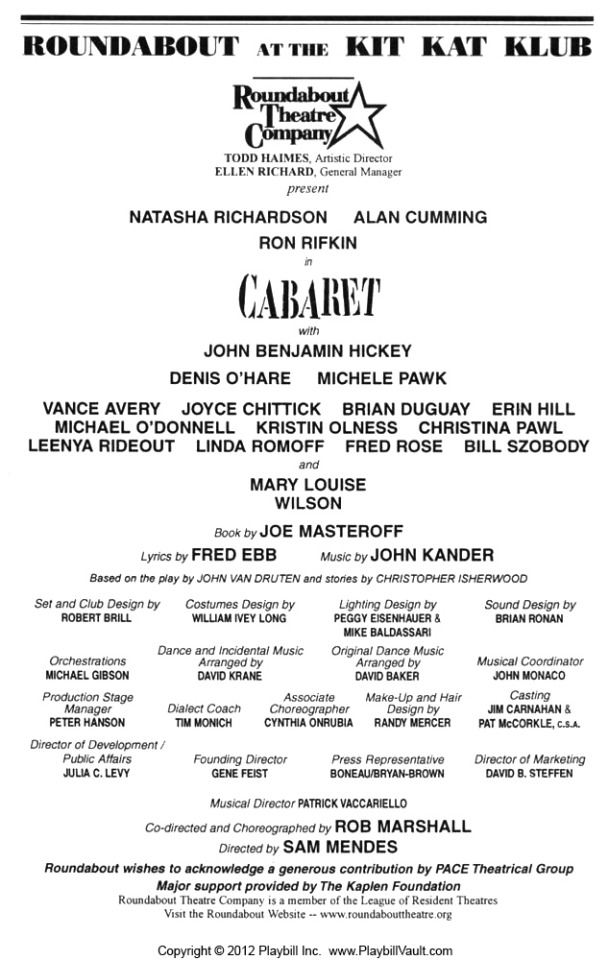
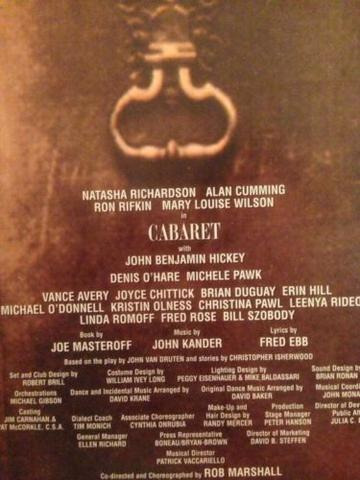
Left: opening night Playbill billing. Right: lobby poster billing
But though nominations seemed to make sense, it still didn't jive with billing placement. In the 1998 production, Richardson, Cumming, and Rifkin all had "above-the-title" with Wilson in the featured "and" slot. Despite this placement, Rifkin went in for Featured. Producers can lobby the Tony committee for actor placement if they think it fitting, and these days we're a lot more fast-and-loose with the definitions. Note however, how Wilson has "above-the-title" billing in the lobby board. This was presumably a contractual renegotiation that happened post-Tonys. Note how Denis O'Hare (Ernst) and Michele Pawk (Kost) have their own line below John Benjamin Hickey (Cliff). All three were/are modest, but known, names in the theatre world, about equal to one another, at least at the time.
By 2014, the old couple (Schultz and Schneider) no longer would get top billing. Alan Cumming only built upon Joel Grey's foundation to fully elevate the Emcee role into the undisputed leading man, with Sally the star-vehicle leading lady. Between the 1998 and up until the recent revival, the older couple's story--and Cliff's importance--had taken a backseat.
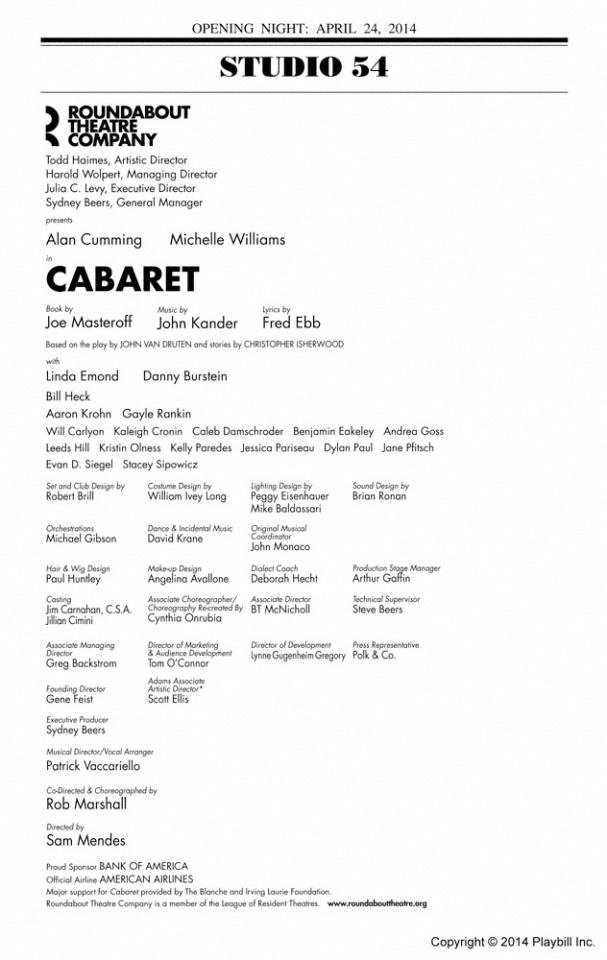

Left: opening night Playbill billing. Right: poster billing.
In 2014, the revival won no Tonys, but was nominated for both Featured Actor and Actress (Danny Burstein and Linda Emond, respectively). Cumming was not eligible as, like Joel Grey before him, he was reprising his role. This time, with a Tony in his pocket, and a much bigger name than 16 years prior, he got left-side billing. Emond and Burstein received equal line billing below the title, with Emond getting the left. Though they were roughly equal in the theatre world, and Burstein had a slight edge in terms of Tony noms, I'd guess Emond got the left owing to her larger screen presence/notoriety. In the poster, Bill Heck (Cliff) is left out of featured billing entirely, as are Aaron Krohn (Ernst) and Gayle Rankin (Kost).
Now we come to our latest revival, number four. Though it's still too early for nominations, we can assume Eddie Redmayne (Emcee) and Gayle Rankin (Sally) will be leads with all others featured. Historically, Schultz and Schneider are roles that receive nominations, and the Emcee a role that wins. Will that hold in a wildly over-crowded season?
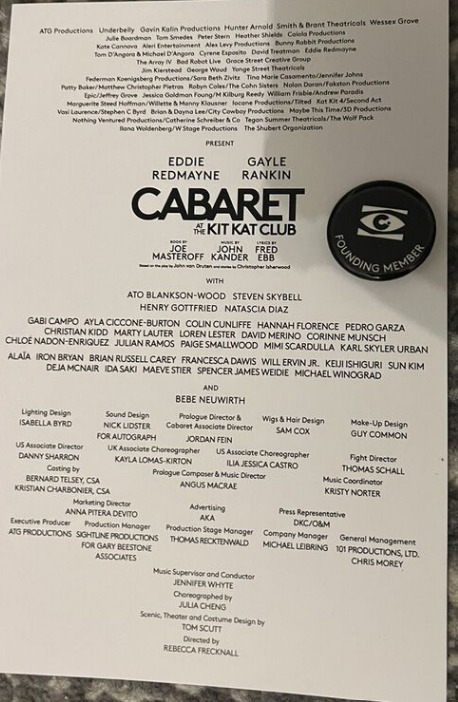
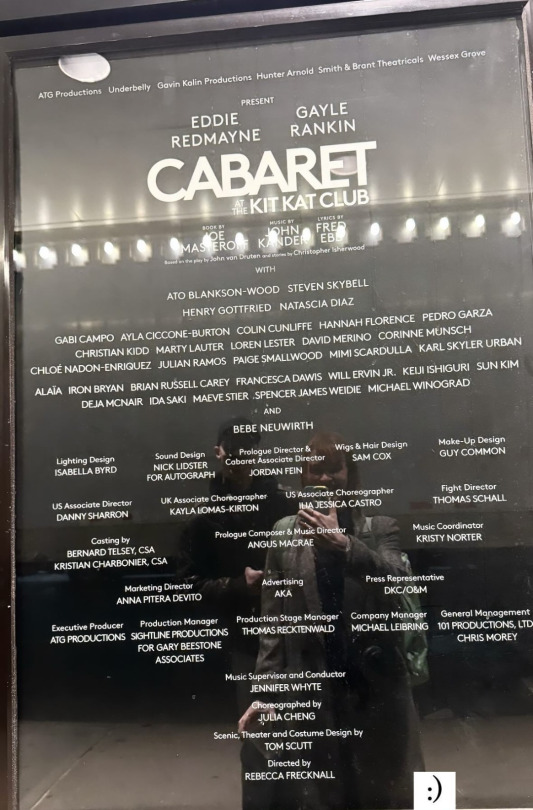
Left: first preview Playbill insert. Right: billing poster outside the theater.
Once more deviating from past productions, the roles of Cliff (Ato Blankson-Wood), Ernst (Henry Gottfried), and Kost (Natascia Diaz) are plucked back out of the company to be given featured billing. This time, Steven Skybell (Schultz) is on even footing with Cliff, even slightly under with his right-side billing. This would be the least "elevated" billing any Schultz has ever gotten. Skybell is a respected theatre veteran but not quite a household name, even in theatre circles. Blankson-Wood, meanwhile, is a recent Tony nominee. It's all politics when it comes to billing.
Here, Bebe Neuwirth (Schneider) is given the coveted "and" poster billing, no surprise. Of the featured roles, she's inarguably the biggest name. A few decades ago, that might have been enough to get her above the title, but these days it's less common that a solidly featured role would get that (unless you're Patti LuPone in Company, and Bebe doesn't have quite the same sway or ego).
This, to me, seems like the most obvious case of industry politics and agent negotiation at play, and usually actors (and egos) aren't even involved in the conversation. Skybell and Neuwirth aren't on the same level, though their characters are. My guess here is that producers want to bill their sole two-time Tony winner separately, and Skybell's agents know he isn't big enough to dispute that.

Now, let's take a look at this marketing design. Redmayne's name is left-billed despite being above Rankin's head. While annoying for those of us audience members who might just see this as a design flaw, this is all contractual, negotiated to death. Redmayne also gets front-and-center positioning, while Rankin is in the background, off-center, but she gets left-side position, which isn't as minimizing as right-side would. Left-billing is given to the bigger name because English reads left to right. These are the kinds of things I think about when I see marketing ads and playbills.
#cabaret#cabaret broadway#history lessons with doa#ask me about the sweeney todd teaser key art please it's an even better example of contracts at play#yeah i *did* stalk the ebay pages until someone put a playbill picture up for listing i'm just that dedicated to the craft#bebe neuwirth#joel grey#alan cumming#it's 9:30 a.m. but we're going live with this because why the fuck not?
24 notes
·
View notes
Text
Movie Musical Divas Tournament: Round 2


Hermione Gingold (1897-1987): Gigi (1958) - Madame Alvarez | The Music Man (1962) - Eulalie Mackechnie Shinn | A Little Night Music (1977) - Mme. Armfeldt
"Absolute iconic queen with a gravelly voice that drags across your heart and embeds itself deep within you. I wouldn't have forgotten a date with her, no shade to Maurice Chevallier. Was a riot and wrote the most outrageous memoir I've ever read. Would love to go drinking with her" - anonymous
Pearl Bailey (1918-1990): Carmen Jones (1958) as Frankie | St. Louis Blues (1958) as Aunt Hagar | Porgy and Bess (1959) as Maria
"like have you heard her sing???" - anonymous
This is Round 2 of the Movie Musical Divas tournament. Additional polls in this round may be found by searching #mmround2, or by clicking the link below. Add your propaganda and support by reblogging this post.
ADDITIONAL PROPAGANDA AND MEDIA UNDER CUT: ALL POLLS HERE
Hermione Gingold:



youtube
Photos and video submitted by: anonymous
Pearl Bailey:



youtube
Photos submitted by: anonymous | Video submitted by: @mygreatadventurehasbegun
14 notes
·
View notes
Text
#Stephen Sondheim#into the woods#company#follies#a little night music#merrily we roll along#Sweeney todd#I'd have included charlotte malcolm if there was room and I didn't have two others for ALNM already#Gussie not included bc she doesn't have enough character pathos for the archetype#Phyllis and The Baker's Wife are messy but relatively speaking they have their shit together
88 notes
·
View notes
Text



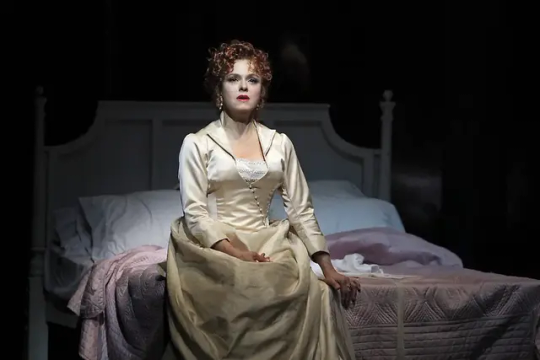
Stephen Sondheim's masterpiece, A Little Night Music, opened on Broadway in 1973 starring Glynis Johns as Desiree Armfeldt and Len Cariou as Fredrik Egerman. William Daniels, pictured here with Glynis Johns, later was cast as Fredrik. In his review of the original 1973 Broadway production, Clive Barnes in The New York Times called the musical "heady, civilized, sophisticated and enchanting." He noted that "the real triumph belongs to Stephen Sondheim...the music is a celebration of 3/4 time, an orgy of plaintively memorable waltzes, all talking of past loves and lost worlds...There is a peasant touch here." He commented that the lyrics are "breathtaking".
It was gloriously revived in 2009 starring Catherine Zeta-Jones as Desiree and Angela Lansbury as her mother, Madame Armfeldt. For her performance, Zeta-Jones won the Tony Award for Best Actress in a Musical.
When Zeta-Jones left the show, Bernadette Peters was cast as Desiree. Steven Suskin, reviewing the new Broadway cast for Variety, wrote "What a difference a diva makes. Bernadette Peters steps into the six-month-old revival of A Little Night Music with a transfixing performance, playing it as if she realizes her character's onstage billing -- "the one and only Desiree Armfeldt"—is clichéd hyperbole. By figuratively rolling her eyes at the hype, Peters gives us a rich, warm and comedically human Desiree, which reaches full impact when she pierces the façade with a nakedly honest, tears-on-cheek "Send in the Clowns.''
#a little night music#stephen sondheim#broadway musical#glynis johns#william daniels#catherine zeta jones#angela lansbury#bernadette peters
9 notes
·
View notes
Text
youtube
everyone moved on but personally? i still want donna murphy to play madam armfeldt in a little night music
#donna murphy#send in the clowns#sondheim#recently decided to rewatch passion and then the sondheim 90th celebration and so. i am going through it#re: pretty ladies
12 notes
·
View notes
Text
Character Propaganda Pages Pt 1
Links to all the propaganda pages for each character in the tournament. I plan to add links to each page as new propaganda is released. Some characters don't have pictures, so please send them if you have any. For characters with lots of propaganda I have compiled sections into a "summary" and that's what will be attached to the polls. I also apologise in advance if I mislabel any actors or characters, I have difficulty recognising faces sometimes.
Marvin Trina Whizzer Brown Mendel Charlotte and Cordelia Jean Valjean The Bishop of Digne (X) Linda Monroe Bill Woodward Mother (TTO) (X) Father (TTO) (X) Tom Houston (X) MacNamara Karen Chasity (X) Solomon Lauter (X) Webby (X) Sweeney Todd (X) Mrs. Lovett The Baker (X) Baker's Wife The Witch Armand (X) Diana Goodman (X) Doctor Frank-N-Furter Marya Dmitrievna Pierre (X) Persephone Willy Wonka (X) Munkustrap (X) Elphaba (X) Claire Zachanassian (X) Heidi (X) Madame Giry (X) Gilles André (X) Erik (Phantom) Christine Daaé (X) June George (X) Delia (X) Barbara Maitland (X) Adam Maitland (X) Fanny Gabor (X) Gregor Vassy Anatoly Sergievsky (X) Walter de Courcey (X) George McFly (X) Phyllis Stone (X) Margaret White (X) Mama Rose Desiree Armfeldt (X)
#marvin propaganda#trina weisenbachfeld propaganda#whizzer brown propaganda#mendel weisenbachfeld propaganda#charlotte and cordelia propaganda#jean valjean propaganda#linda monroe propaganda#bill woodward propaganda#mother (tto) propaganda#father (TTO) propaganda#tom houston propaganda#john macnamara propaganda#solomon lauter propaganda#karen chasity propaganda#webby propaganda#sweeney todd propaganda#mrs lovett propaganda#the baker propaganda#baker's wife propaganda#the witch propaganda#armand propaganda#diana goodman propaganda#doctor frank-n-furter propaganda#marya dmitrievna propaganda#persephone propaganda#willy wonka propaganda#munkustrap propaganda#elphaba propaganda#claire zachanassian propaganda#heidi hansen propaganda
19 notes
·
View notes
Text
chita would have made such a great madame armfeldt
2 notes
·
View notes
Text










Sad to hear of the passing of Actress Glynis Johns (1923-2024)
Glynis Johns, a Tony Award-winning stage and screen star who played the mother opposite Julie Andrews in the classic movie “Mary Poppins” and introduced the world to the bittersweet standard-to-be “Send in the Clowns” by Stephen Sondheim, has died.
She was 100.
she died at an assisted living home in Los Angeles of natural causes.
Her greatest triumph was playing Desiree Armfeldt in “A Little Night Music,” for which she won a Tony in 1973. Sondheim wrote the show’s hit song “Send in the Clowns” to suit her distinctive husky voice.
Johns was the fourth generation of an English theatrical family. Her father, Mervyn Johns, had a long career as a character actor and her mother was a pianist. She was born in Glynis Margaret Payne Johns Oct 5, 1923 in Pretoria, South Africa.
Johns was a dancer at 12 and an actor at 14 in London’s West End. Her breakthrough role was as the amorous mermaid in the title of the 1948 hit comedy “Miranda.”
In 1960’s “The Sundowners,”she was nominated for a best supporting actress Oscar.
She had a Good career in tv and movies having parts in “The Court Jester” “The Sundowners” The Vault of Horrors” “The Ref” “While you were sleeping “ and “Superstar”
Tv roles include “Burke’s Law,” “The Love Boat” and an appearance as a villainess “Lady Penelope Peasoup on “Batman”
Other highlights include playing the mother in “Mary Poppins,”She also starred in the 1989 Broadway revival of “The Circle,”
In a 1991 revival of “A Little Night Music”she played Madame Armfeldt, the mother of Desiree, the part she had created. In 1963, she starred in her own TV sitcom “Glynis.”
Johns lived all around the world and had four husbands. The first was the father of her only child, the late Gareth Forwood, an actor who died in 2007.
My Condolences to her Family Members and Friends.
#R.I.P. 😔🙏🥀
2 notes
·
View notes
Text
Angela Lansbury - Liaisons (Act One)
youtube
Composer, Lyricist: Stephen Sondheim
[MADAME ARMFELDT] At the villa of the Baron De Signac Where I spent a somewhat infamous year At the villa of the Baron De Signac I had ladies in attendance Fire-opal pendants
Liaisons! What's happened to them Liaisons today? Disgraceful! What's become of them? Some of them Hardly pay their shoddy way
What once was a rare Champagne Is now just an amiable hock What once was a villa, at least Is "digs" What once was a gown with train Is now just a simple little frock What once was a sumptuous feast Is figs No, not even figs— Raisins Ah, liaisons!
Now, where was I? Where was I? Oh, yes You might also like In Praise Of Women Laurence Guittard You Must Meet My Wife Glynis Johns & Len Cariou Pick a little, talk a little Hermione Gingold At the palace of the Duke of Ferrara Who was prematurely deaf but a dear At the palace of the Duke of Ferrara I acquired some position Plus a tiny Titian
Liaisons! What's happened to them Liaisons today? To see them—indiscriminate Women, it Pains me more than I can say The lack of taste that they display
Where is style? Where is skill? Where is forethought? Where's discretion of the heart Where's passion in the art Where's craft? With a smile And a will But with more thought I acquired a château Extravagantly o- Verstaffed Too many people muddle sex With mere desire And when emotion intervenes The nets descend It should on no account perplex Or worse, inspire It's but a pleasurable means To a measurable end Why does no one comprehend? Let us hope this lunacy is just a trend
Where was I? Where was I? Oh, yes
In the castle of the King of the Belgians We would visit through a false chiffonier In the castle of the King of the Belgians Who, when things got rather touchy Deeded me a duchy
Liaisons! What's happened to them? Liaisons today Untidy—take my daughter, I Taught her, I Tried my best to point the way I even named her Desiree In a world where the kings are employers Where the amateur prevails And delicacy fails To pay In a world where the princes are lawyers What can anyone expect Except to recollect Liai—
[She falls asleep]
2 notes
·
View notes
Text
In talks 👥️ to star ⭐️ as Madame Armfeldt 👵🍇 in A Little Night Music 🌚🎶 but it's a 🙊secret 🤫 shhhhhh 💃💋
9 notes
·
View notes
Note
thoughts on a possible a little night music dream cast? 🫡
Okay, so I lied. I don't have a realistic A Little Night Music dream cast locked and loaded because I've spent too much time watching "A Weekend in the Country" from the Sondheim 75th birthday concert where Rebecca Luker is like forty-five and singing Anne, so my concept of realistic age casting is poisoned. But who's to say we can't have a concert version where Anne is a middle-aged soprano and it's just...understood?
So, here's my too-old concert dream cast.
Desiree: Donna Murphy (she can do anything--however if Jan Maxwell was still alive...) Fredrik: Brian Stokes Mitchell (*the* leading man of Broadway) Anne: Kelli O'Hara (the aging ingenue) Henrik: gonna be honest, I don't know or care about any male actor under like fifty so, I don't even know who's in the running Petra: Victoria Clark (let me have this) Fredrika: Samantha Williams or Anna Zavelson (it took everything in me not to seriously put Celia Keenan-Bolger) Madame Armfeldt: Mary Beth Peil (she's done it once, let her do it again) Charlotte (I have a Charlotte for any occasion): Bebe Neuwirth; Luba Mason; Carolee Carmello; Debra Monk; Mary Testa; Harriet Harris; Tracie Bennett; Beth Leavel; basically any Diva over fifty Carl-Magnus: Michael Cerveris (yeah, he can stay) The Quintet: Marquee Five (my favorite cabaret group)
Trust me, my Follies dream cast is much more grounded in reality (it's not, but I have the dream one *and* the real one ready to go).
2 notes
·
View notes
Text
Movie Musical Divas Tournament: Round 1


Hermione Gingold (1897-1987): Gigi (1958) - Madame Alvarez | The Music Man (1962) - Eulalie Mackechnie Shinn | A Little Night Music (1977) - Mme. Armfeldt
"Absolute iconic queen witha gravelly voice that drags across your heart and embeds itself deep within you. I wouldn't have forgotten a date with her, no shade to Maurice Chevallier. Was a riot and wrote the most outrageous memoir I've ever read. Would love to go drinking with her" - anonymous
Claire Luce (1903-1989): Let's Make a Night of It (1937) - Viola Vanders | Over She Goes (1937) - Pamela Ward
"claire luce only appeared in a small number of movies, but in an indirect way she had an important influence on the history of the movie musical as fred astaire, who she worked with on the stage, credits her with helping him figure out how to evolve his dancing after his sister and longtime dance partner adele left the business. claire and fred starred together in the original broadway production of the gay divorce in 1932, fred's first attempt to make a success as fred astaire and not just as half of fred-and-adele. claire encouraged him to take a more romantic approach to his dancing, saying "Come on, Fred, I'm not your sister, you know." fred wrote in his autobiography, "Claire was a beautiful dancer and it was her style that suggested to me the whole pattern of the 'Night and Day' dance. This was something entirely different from anything Adele and I had done together. That was what I wanted, an entirely new dancing approach." the success of the gay divorce was credited to the impact of the night and day number, and the movie version, retitled the gay divorcee, helped to usher in a whole era in film musicals. fred lobbied for claire to be his co-star in the movie, but was overruled by the studio. claire also sadly suffered an injury in the london run of the show that curtailed her dancing career. however she is very charming in the few movies she's in, still moves beautifully, and has a distinctive voice that kind of reminds me of glynis johns. also a fun fact about her is she ran away from home to become a dancer with a russian opera troupe when she was 15." - anonymous
This is Round 1 of the Movie Musical Divas tournament. Additional polls in this round may be found by searching #mmround1, or by clicking the link below. Add your propaganda and support by reblogging this post.
ADDITIONAL PROPAGANDA AND MEDIA UNDER CUT: ALL POLLS HERE
Hermione Gingold:



youtube
Photos and video submitted by: anonymous
Claire Luce:



youtube
Photos and video submitted by: anonymous
12 notes
·
View notes
Text

September 3, 1974: The national tour of Night Music stops at the Curran in San Francisco. Pictured: Margaret Hamilton as Madame Armfeldt.
3 notes
·
View notes
Text
its so funny to me that Desiree and Madame Armfeldt each view the other's profession as shameful or disreputable when my main reference point for historical views of actors and sex workers is the early modern English going "put all that garbage on the same side of the river"
0 notes
Text
her speech when she wins featured actress in a musical in 2055 for playing madame armfeldt in a little night music starring ayo edebiri as desiree is gonna be fantastic
the question is will audra end up breaking double digits with her tony wins
20 notes
·
View notes